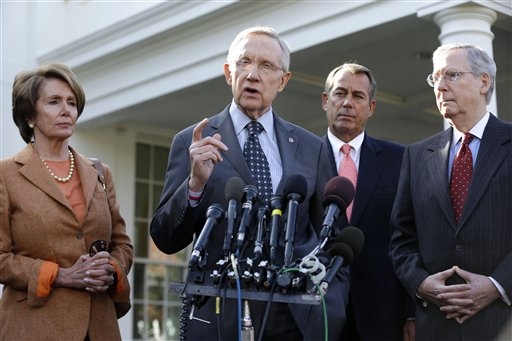
WASHINGTON (AP) — Congressional leaders from both parties voiced fresh optimism after meeting with newly re-elected President Barack Obama about avoiding year-end "fiscal cliff" tax increases and spending cuts that would hammer America's middle class and risk plunging the economy into recession.
Obama's Democrats and opposition Republicans have until the end of the year to work out a deal each side could live with, and that would have a softer impact on the economy that is still recovering very slowly from the last recession.
The leader of the House, Speaker John Boehner, said Friday his Republicans are willing to consider increased revenue "as long as it is accompanied by spending cuts" as leaders in a divided government get to work on a possible deal after a fierce election campaign.
Republicans are opposed to increasing tax rates and want to cut spending, while Democrats don't want to cut into social programs from health care to education, and are proposing raising taxes on richer Americans.
Boehner presented a framework that one official said called for a deficit down-payment of unspecified size by year's end, to be followed by comprehensive tax reform and an overhaul of health care for the elderly and other benefit programs in 2013.
Democrats indicated some spending cuts would be fine with them. "I feel confident that a solution may be in sight," said House Democratic leader Nancy Pelosi.
The goal of the high-pressure talks to come is to produce a multitrillion-dollar deficit-reduction plan that can take the place of the across-the-board tax increases and spending cuts that are slated to take effect on Jan. 1.
In remarks while reporters were present, Obama stressed that time was short as he welcomed the leaders to the White House on Friday for the first time since winning re-election this month. "We have urgent business to do," he said.
There was no indication that the meeting touched on Obama's campaign-long call to raise tax rates at upper incomes.
After the meeting, White House Press Secretary Jay Carney said, "Both sides agreed that while there may be differences in our preferred approaches, we will continue a constructive process to find a solution and come to a conclusion as soon as possible."
For all the expressions of optimism, it was unclear whether the Nov. 6 elections and the prospect of the so-called fiscal cliff would serve as a strong enough catalyst for these talks to succeed where other recent attempts have failed.
Obama ran for a new term calling for a "balanced approach" to deficit reduction that includes raising taxes on income over $200,000 a year for individuals and $250,000 for couples. And while the president has stated a willingness to pull federal savings out of benefit programs including government health insurance for the elderly and the poor, Democratic leaders have been reluctant to go along.
Raising taxes has long been anathema to Republicans, who say government's spending must be cut to reduce deficits and taxes reduced to stimulate job creation in an economy where unemployment is 7.9 percent.
Boehner told reporters after Friday's meeting that he had outlined a framework for negotiations that "is consistent with the president's call for a fair and balanced approach." He did not provide details, except to say it "deals with reforming our tax code and reforming our spending."
An aide said Boehner's approach calls for agreement on long-term revenue and spending targets to be set into law, presumably this year, leaving details to 2013 on an overhaul of the tax code and remaking benefit programs.
Obama favors $1.6 trillion in higher taxes over the next decade, in part by allowing existing cuts to expire on Dec. 31 on higher incomes.
White House officials claim an overall deficit reduction package totaling more than $4 trillion, although that includes $1 trillion in spending cuts agreed to last year, and an additional $1 trillion in spending no longer needed for the wars in Iraq and Afghanistan. Republicans and independent fact checkers dispute the claimed savings from the two wars, since the money was borrowed in the first place.
Whatever the obstacles to a deal, there is little dispute about the cost of failure.
Under current law, tax cuts that took effect more than a decade ago will expire at all income levels at the end of the year, as will Bush-era reductions for investors, married couples, families with children and others.
As well, the defense budget would be cut by $55 billion, and domestic programs would incur a reduction of the same size.
Unemployment benefits for some of the longest-term jobless also expire at the end of the year.
Boehner has said previously that any agreement should include an increase in the national debt limit, now $16.4 trillion. The Treasury is expected to hit that cap sometime in the next few months.